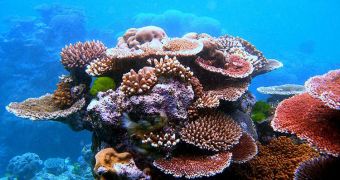During a scientific expedition that focused on submarine canyons located off the northeastern coast of the United States, experts from the Northeast Fisheries Science Center (NEFSC) and the National Ocean Service (NOS) Biogeography Branch discovered new, healthy coral and sponge hot spots.
This is the first time in several decades when such a discovery is made. The findings could go a long way towards improving coral habitat suitability models, which are used to determine the locations where coral reefs are likely to occur.
NEFSC and NOS BB investigators are working together on developing this model. They boarded the US National Oceanic and Atmospheric Administration's (NOAA) research vessel Henry B. Bigelow on July 6, and conducted a series of investigations on canyons in the Atlantic Ocean.
Off New Jersey, they investigated the Toms, Middle Toms, and Hendrickson canyons, in addition to the Veatch and Gilbert canyons off Georges Bank. The team suspected that corals may exist here, but they couldn't be sure until they sampled the areas, Science Blog reports.
Although located very close to the continental US, the 70 deepwater canyons discovered alongside North America's continental shelf and slope have thus far been studied only in passing. These submerged structures are between 100 and 3,500 meters (330 to 11,500 feet) deep.
“The deep-sea coral and sponge habitats observed in the canyons are not like those found in shallow-water tropical reefs or deep-sea coral habitats in other regions,” expert Martha Nizinski says.
“We know very little about the distribution and ecology of corals in the canyons off the Northeast coast. Although our explorations have just begun, we’ve already increased our knowledge about these deepwater coral habitats a hundred times over,” she adds.
The expert holds an appointment as a zoologist and deep-sea coral specialist at the NEFSC National Systematics Laboratory, in Washington, DC. She was the chief scientist on the new expedition.
“These are the first surveys in several decades for deep-sea corals and sponges in the mid-Atlantic,” says NEFSC James J. Howard Marine Sciences Laboratory marine ecologist, David Packer.
Investigators from the NOS National Centers for Coastal Ocean Science's Biogeography Branch, the NOAA Office of Ocean Exploration, and the Delaware Museum of Natural History, were also a part of the science team.

 14 DAY TRIAL //
14 DAY TRIAL //